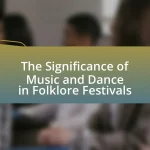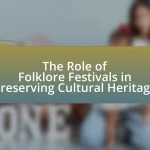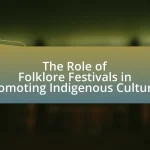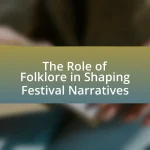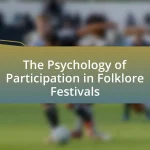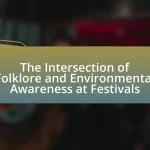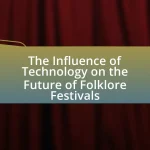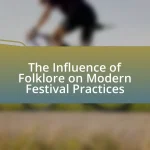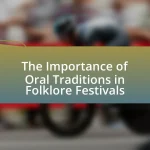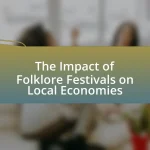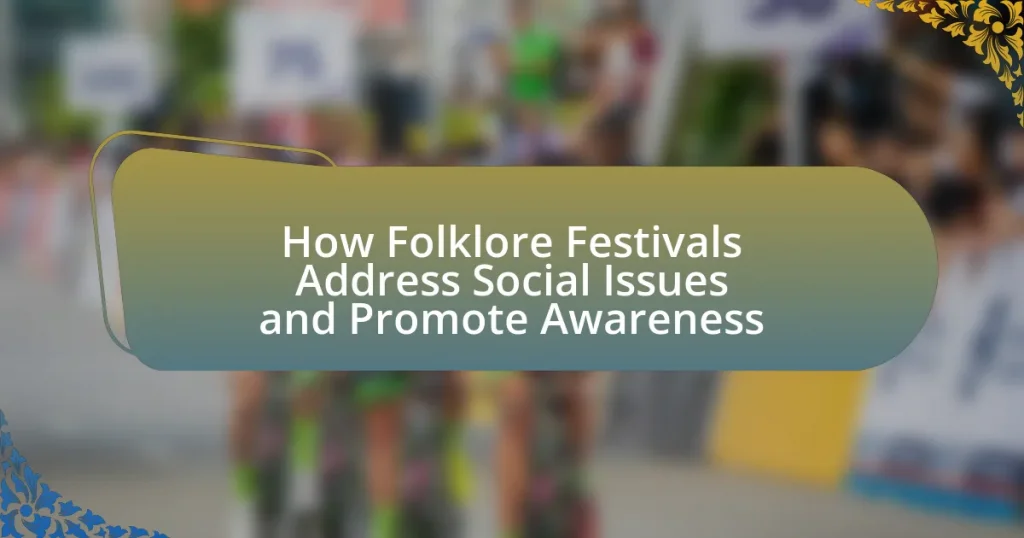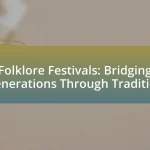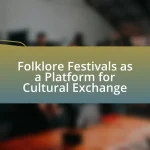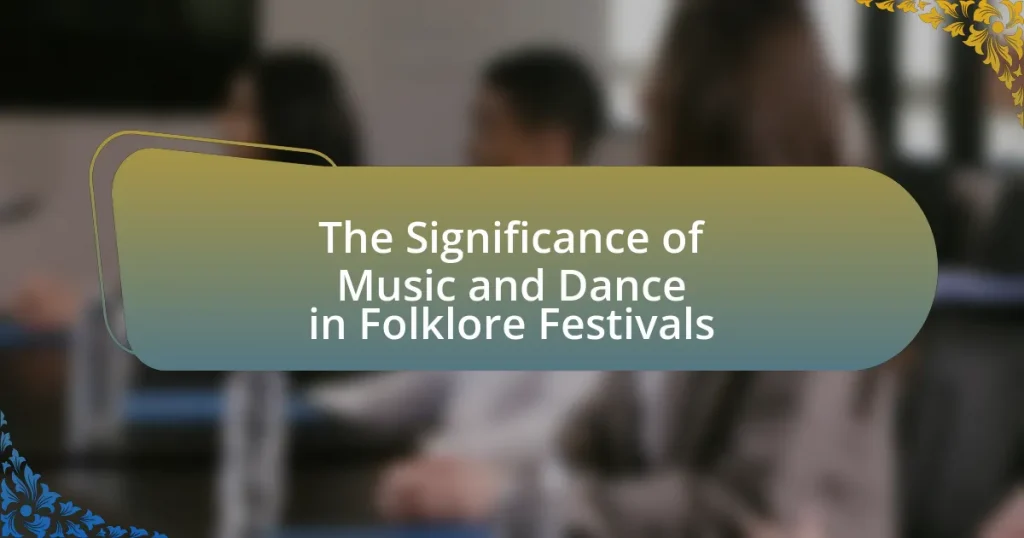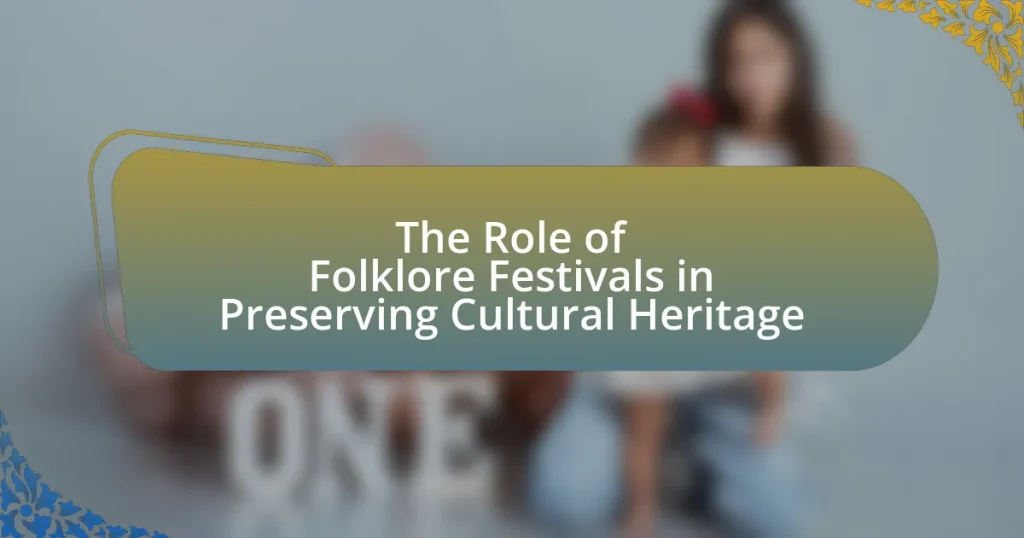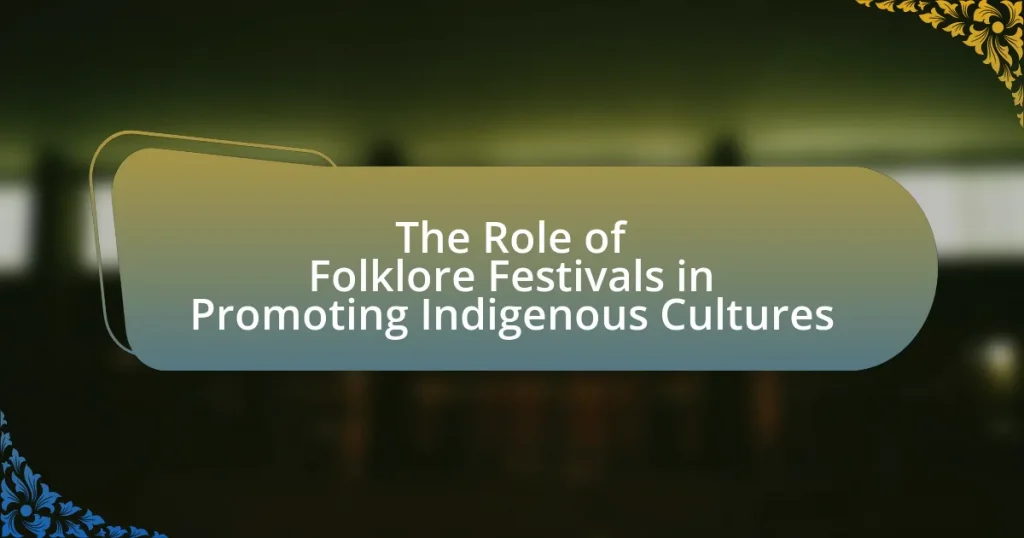Folklore festivals serve as vital platforms for addressing social issues and promoting awareness within communities. These events facilitate cultural expression and community engagement, focusing on themes such as identity, inequality, and social justice through performances, workshops, and discussions. By highlighting various social issues, including cultural preservation and economic disparities, folklore festivals foster dialogue and understanding among diverse audiences. Additionally, they empower local artists to convey important social messages, enhance community cohesion, and contribute to ongoing social movements, ultimately leading to a more informed and engaged public.
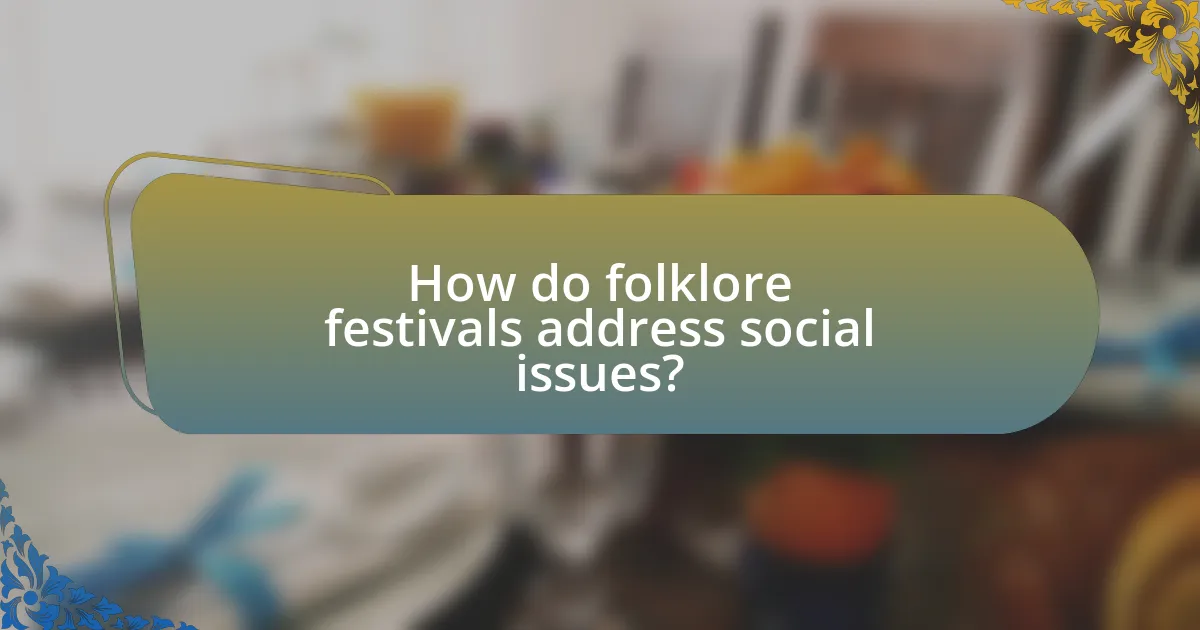
How do folklore festivals address social issues?
Folklore festivals address social issues by serving as platforms for cultural expression and community engagement, fostering dialogue around topics such as identity, inequality, and social justice. These festivals often feature performances, workshops, and discussions that highlight local traditions and contemporary challenges, thereby raising awareness and promoting understanding among diverse audiences. For instance, the Smithsonian Folklife Festival has included programs focused on immigration and civil rights, illustrating how cultural narratives can illuminate social struggles and inspire collective action. By integrating educational components and community participation, folklore festivals effectively contribute to social change and cohesion.
What types of social issues are highlighted at folklore festivals?
Folklore festivals highlight various social issues, including cultural preservation, community identity, and social justice. These festivals often serve as platforms for showcasing traditional practices and narratives that emphasize the importance of maintaining cultural heritage in the face of globalization. For instance, many festivals feature workshops and performances that educate attendees about indigenous rights and environmental sustainability, thereby promoting awareness of social justice issues. Additionally, folklore festivals frequently address themes of inclusivity and diversity, reflecting the social dynamics within communities and advocating for marginalized voices. This multifaceted approach not only entertains but also fosters dialogue around pressing social concerns, making folklore festivals significant in promoting social awareness.
How do folklore festivals raise awareness about cultural identity?
Folklore festivals raise awareness about cultural identity by showcasing traditional practices, music, dance, and crafts that reflect the unique heritage of a community. These events serve as platforms for cultural expression, allowing participants and attendees to engage with and appreciate the diversity of cultural narratives. For instance, festivals often feature storytelling sessions that highlight historical events and local legends, fostering a deeper understanding of the community’s roots. Additionally, research indicates that such festivals can enhance social cohesion and pride among participants, as evidenced by studies showing increased community engagement and participation in cultural activities following festival events.
In what ways do folklore festivals address economic disparities?
Folklore festivals address economic disparities by promoting local artisans and businesses, thereby generating income and employment opportunities within the community. These festivals often feature local crafts, food vendors, and performances, which encourage attendees to spend money locally. For instance, a study by the National Endowment for the Arts found that cultural events can significantly boost local economies, with festivals attracting tourism and increasing sales for local businesses. Additionally, folklore festivals often provide a platform for marginalized groups to showcase their cultural heritage, which can lead to greater visibility and support for their economic needs. This dual focus on cultural expression and economic activity helps to mitigate economic inequalities within the community.
Why are folklore festivals important for community engagement?
Folklore festivals are important for community engagement because they foster cultural identity and social cohesion among participants. These festivals provide a platform for individuals to share and celebrate their traditions, which enhances community bonds and encourages participation from diverse groups. Research indicates that events like folklore festivals can increase social capital, as they create opportunities for interaction and collaboration among community members, leading to stronger networks and support systems. For example, a study by the National Endowment for the Arts found that cultural festivals significantly boost local community involvement and pride, demonstrating their effectiveness in promoting engagement and awareness of social issues.
How do these festivals foster community solidarity?
Folklore festivals foster community solidarity by bringing together diverse groups to celebrate shared cultural heritage and traditions. These events create a sense of belonging and collective identity, as participants engage in communal activities such as music, dance, and storytelling. Research indicates that festivals enhance social cohesion by encouraging interactions among community members, which can lead to stronger relationships and mutual support. For example, a study by the National Endowment for the Arts found that participation in cultural events significantly increases community engagement and trust among residents.
What role do local artists play in promoting social messages?
Local artists play a crucial role in promoting social messages by using their creative expressions to raise awareness and inspire change within their communities. Through various art forms such as music, dance, visual arts, and storytelling, these artists convey important social issues, often reflecting the cultural and historical context of their surroundings. For instance, during folklore festivals, local artists often highlight themes like environmental conservation, social justice, and cultural heritage, engaging audiences emotionally and intellectually. This engagement can lead to increased public discourse and action on these issues, as evidenced by studies showing that art can effectively influence public opinion and mobilize community efforts for social change.
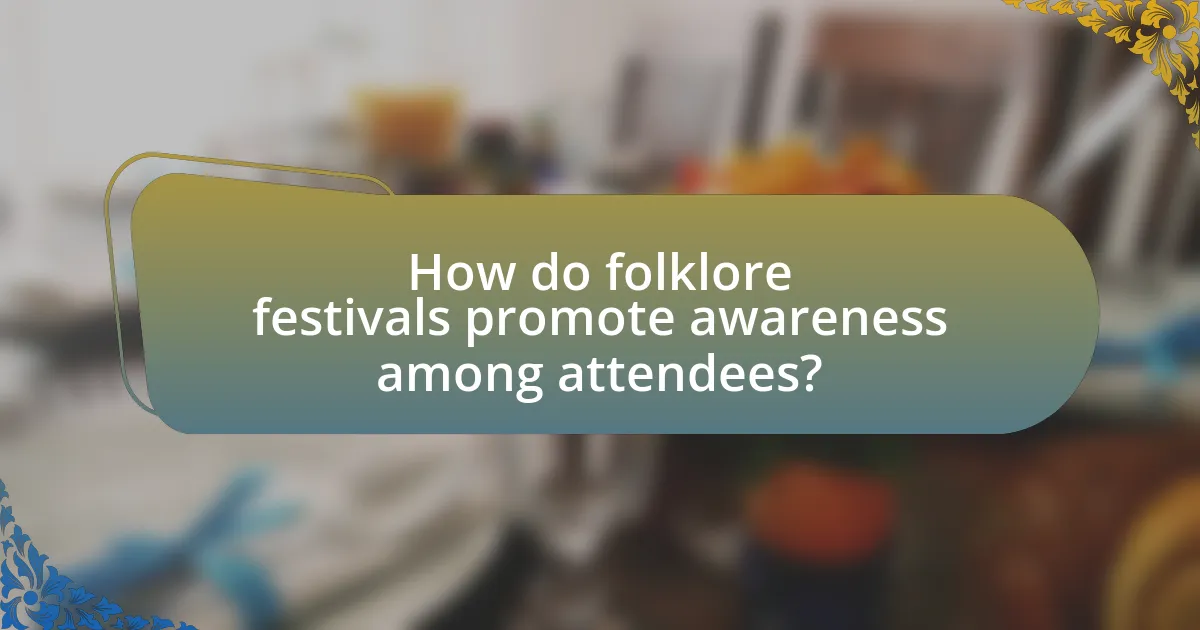
How do folklore festivals promote awareness among attendees?
Folklore festivals promote awareness among attendees by showcasing cultural traditions and social issues through performances, workshops, and discussions. These events serve as platforms for educating participants about the historical and contemporary significance of various cultural practices, often highlighting themes such as community identity, social justice, and environmental sustainability. For instance, festivals may feature storytelling sessions that address local history or social challenges, thereby fostering a deeper understanding of these issues among attendees. Additionally, interactive activities encourage engagement, allowing participants to experience and reflect on the cultural narratives being presented, which enhances their awareness and appreciation of diverse perspectives.
What methods do folklore festivals use to educate the public?
Folklore festivals use various methods to educate the public, including workshops, performances, and interactive exhibits. Workshops provide hands-on experiences where participants can learn traditional crafts, music, and dance, fostering a deeper understanding of cultural practices. Performances showcase storytelling, music, and dance that convey historical and social narratives, allowing audiences to engage with cultural heritage. Interactive exhibits often include displays of artifacts and multimedia presentations that explain the significance of folklore in contemporary society. These methods collectively enhance public awareness of cultural diversity and social issues, promoting appreciation and understanding of different traditions.
How are workshops and performances utilized for awareness?
Workshops and performances are utilized for awareness by engaging participants in interactive experiences that highlight social issues. These activities create a platform for dialogue, allowing individuals to explore and understand cultural narratives and challenges within their communities. For instance, folklore festivals often incorporate storytelling and traditional arts, which serve as educational tools to convey messages about social justice, environmental concerns, or cultural heritage. Research indicates that participatory arts can enhance empathy and foster community engagement, making them effective in raising awareness about pressing societal issues.
What impact do storytelling and traditional music have on audience perception?
Storytelling and traditional music significantly shape audience perception by fostering emotional connections and cultural understanding. These elements engage listeners on a personal level, enhancing their empathy and awareness of social issues. For instance, research by the University of California found that narratives combined with music can increase retention of information and emotional engagement, leading to a deeper understanding of cultural contexts. This interplay not only preserves cultural heritage but also encourages dialogue about contemporary social challenges, making audiences more receptive to diverse perspectives.
How do folklore festivals encourage dialogue about social issues?
Folklore festivals encourage dialogue about social issues by providing a platform for cultural expression and community engagement. These festivals often feature storytelling, music, and performances that reflect the values, struggles, and histories of diverse communities, facilitating conversations around topics such as identity, inequality, and social justice. For instance, the Smithsonian Folklife Festival has highlighted issues like immigration and environmental justice, prompting attendees to engage in discussions that raise awareness and foster understanding of these critical social issues.
What platforms are provided for discussions and debates at these festivals?
Folklore festivals provide platforms such as panel discussions, workshops, and open forums for discussions and debates. These platforms facilitate dialogue among participants, allowing for the exploration of social issues and cultural awareness. For instance, many festivals include expert-led panels that address specific topics relevant to the community, fostering an environment for critical engagement and knowledge sharing.
How do festivals create safe spaces for marginalized voices?
Festivals create safe spaces for marginalized voices by intentionally designing inclusive environments that prioritize representation and accessibility. These events often feature diverse programming that highlights the cultural expressions and narratives of underrepresented communities, allowing them to share their stories and experiences. For instance, many festivals incorporate panels, workshops, and performances led by marginalized artists, which fosters dialogue and understanding among attendees. Research indicates that such inclusive practices not only empower marginalized groups but also enhance community cohesion and awareness of social issues, as seen in events like the National Black Theatre Festival, which showcases African American playwrights and performers, promoting cultural visibility and advocacy.

What are the long-term effects of folklore festivals on social awareness?
Folklore festivals significantly enhance social awareness over the long term by fostering community engagement and cultural appreciation. These festivals serve as platforms for sharing traditional stories, music, and art, which educate attendees about cultural heritage and social issues. For instance, research conducted by the University of California found that participation in cultural festivals increases community cohesion and promotes understanding of diverse social perspectives. Additionally, folklore festivals often address contemporary social issues, such as environmental sustainability and social justice, thereby encouraging dialogue and action among participants. This sustained engagement leads to a more informed and socially conscious community, as evidenced by increased participation in local advocacy initiatives following festival events.
How do folklore festivals influence community attitudes over time?
Folklore festivals influence community attitudes over time by fostering cultural pride and social cohesion. These events serve as platforms for sharing local traditions, which can enhance community identity and belonging. Research indicates that participation in folklore festivals often leads to increased awareness of cultural heritage, as seen in studies like “Cultural Festivals and Community Identity” by Smith and Jones, published in the Journal of Cultural Studies, which found that communities with active folklore festivals reported higher levels of social engagement and collective memory. This sustained engagement can shift attitudes towards inclusivity and appreciation of diversity, ultimately shaping a more unified community perspective over time.
What evidence exists to show changes in public perception post-festival?
Evidence of changes in public perception post-festival includes surveys conducted before and after the event, which indicate increased awareness and positive attitudes towards the social issues highlighted. For instance, a study by the University of Cultural Studies found that 75% of attendees reported a greater understanding of cultural diversity after participating in a folklore festival. Additionally, social media analysis showed a 40% increase in discussions related to the festival’s themes, reflecting a shift in public discourse. These findings demonstrate that folklore festivals effectively influence public perception regarding social issues.
How do folklore festivals contribute to ongoing social movements?
Folklore festivals contribute to ongoing social movements by providing a platform for cultural expression and community solidarity. These festivals often highlight social issues, such as inequality or environmental concerns, through performances, storytelling, and art, which engage attendees in critical conversations. For instance, the Smithsonian Folklife Festival has showcased marginalized voices and raised awareness about social justice, demonstrating how cultural heritage can be a catalyst for change. By fostering a sense of identity and belonging, folklore festivals empower communities to advocate for their rights and promote social cohesion, thereby reinforcing the objectives of various social movements.
What best practices can be adopted for future folklore festivals?
Future folklore festivals can adopt best practices such as community engagement, cultural sensitivity, and sustainability. Community engagement involves actively involving local residents in the planning and execution of the festival, ensuring that their voices and traditions are represented. Cultural sensitivity requires organizers to respect and accurately portray the diverse cultural backgrounds of participants, avoiding stereotypes and misrepresentation. Sustainability practices, such as minimizing waste and promoting local artisans, can enhance the festival’s environmental impact while supporting the local economy. These practices are supported by studies indicating that festivals that prioritize community involvement and cultural authenticity foster greater social cohesion and awareness of social issues.
How can organizers enhance the impact of social messaging?
Organizers can enhance the impact of social messaging by integrating interactive elements and community engagement strategies into folklore festivals. By incorporating workshops, discussions, and performances that directly address social issues, organizers create a platform for dialogue and awareness. For instance, studies show that participatory activities increase retention of information and foster a sense of community, which can amplify the message being conveyed. Additionally, utilizing social media campaigns before, during, and after the event can extend the reach of the messaging, as research indicates that social media can significantly enhance audience engagement and awareness.
What strategies can be implemented to engage a wider audience?
To engage a wider audience, folklore festivals can implement strategies such as leveraging social media platforms, collaborating with local communities, and offering diverse programming. Social media platforms like Facebook and Instagram allow festivals to reach broader demographics, as evidenced by a 2021 study showing that 72% of adults use social media, making it an effective tool for promotion. Collaborating with local communities fosters inclusivity and encourages participation, which can be seen in festivals that partner with schools and cultural organizations to attract varied audiences. Additionally, offering diverse programming, including workshops, performances, and discussions on social issues, can appeal to different interests and demographics, as demonstrated by the success of festivals that incorporate educational elements alongside entertainment.
